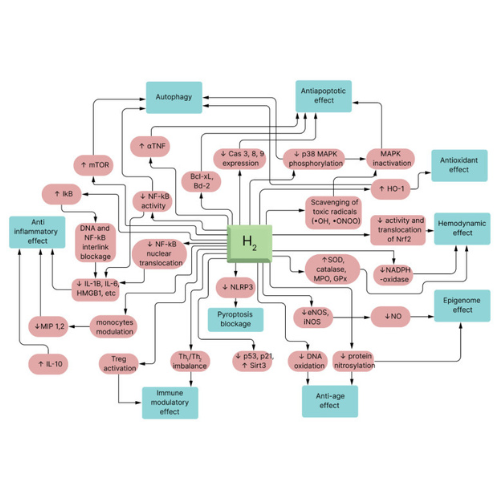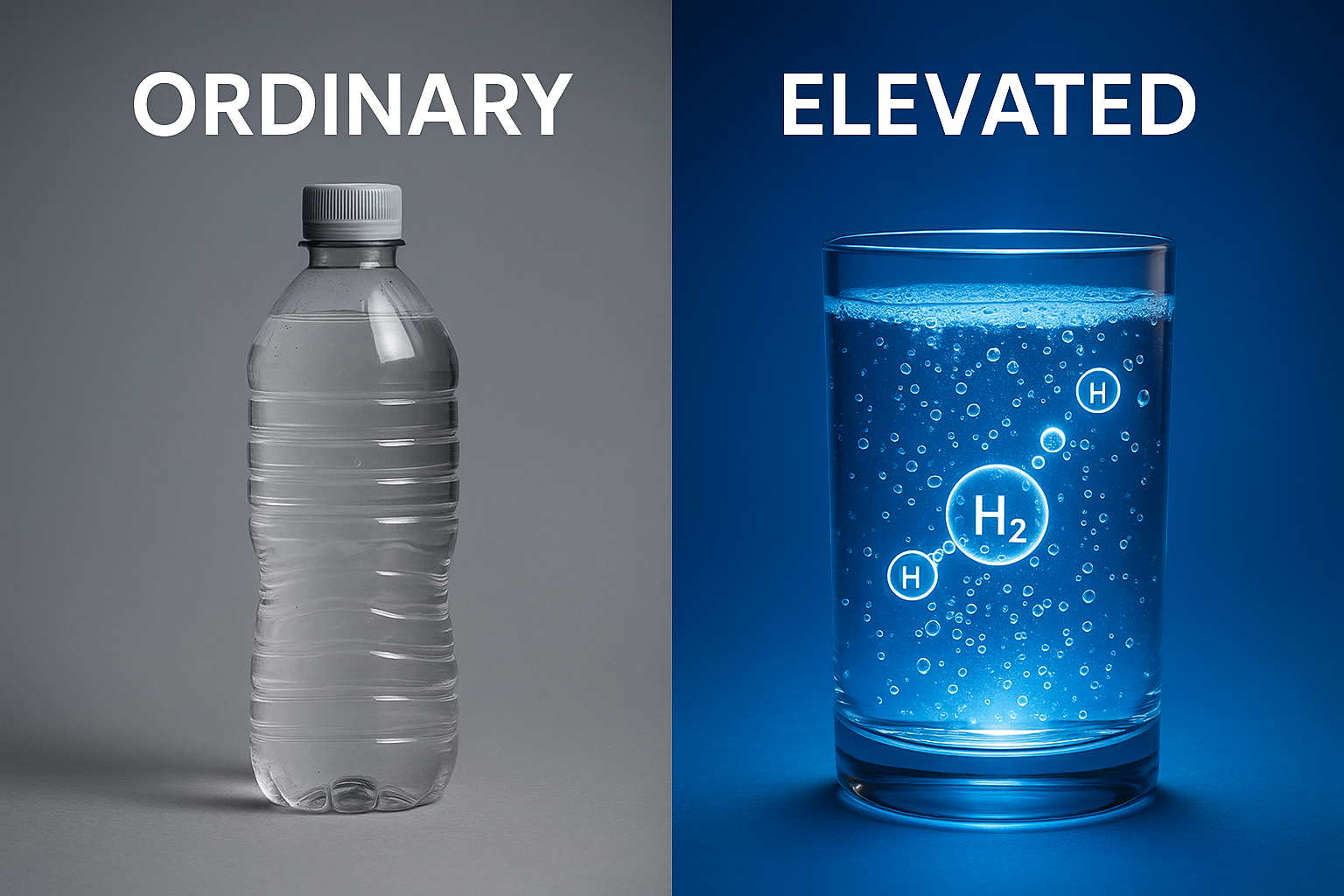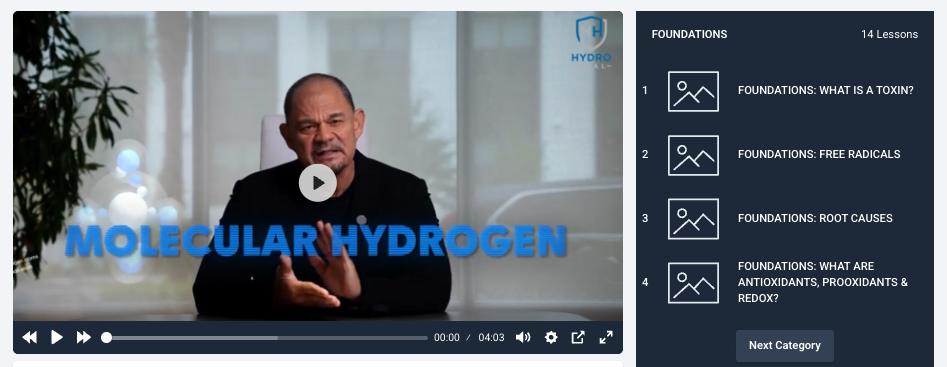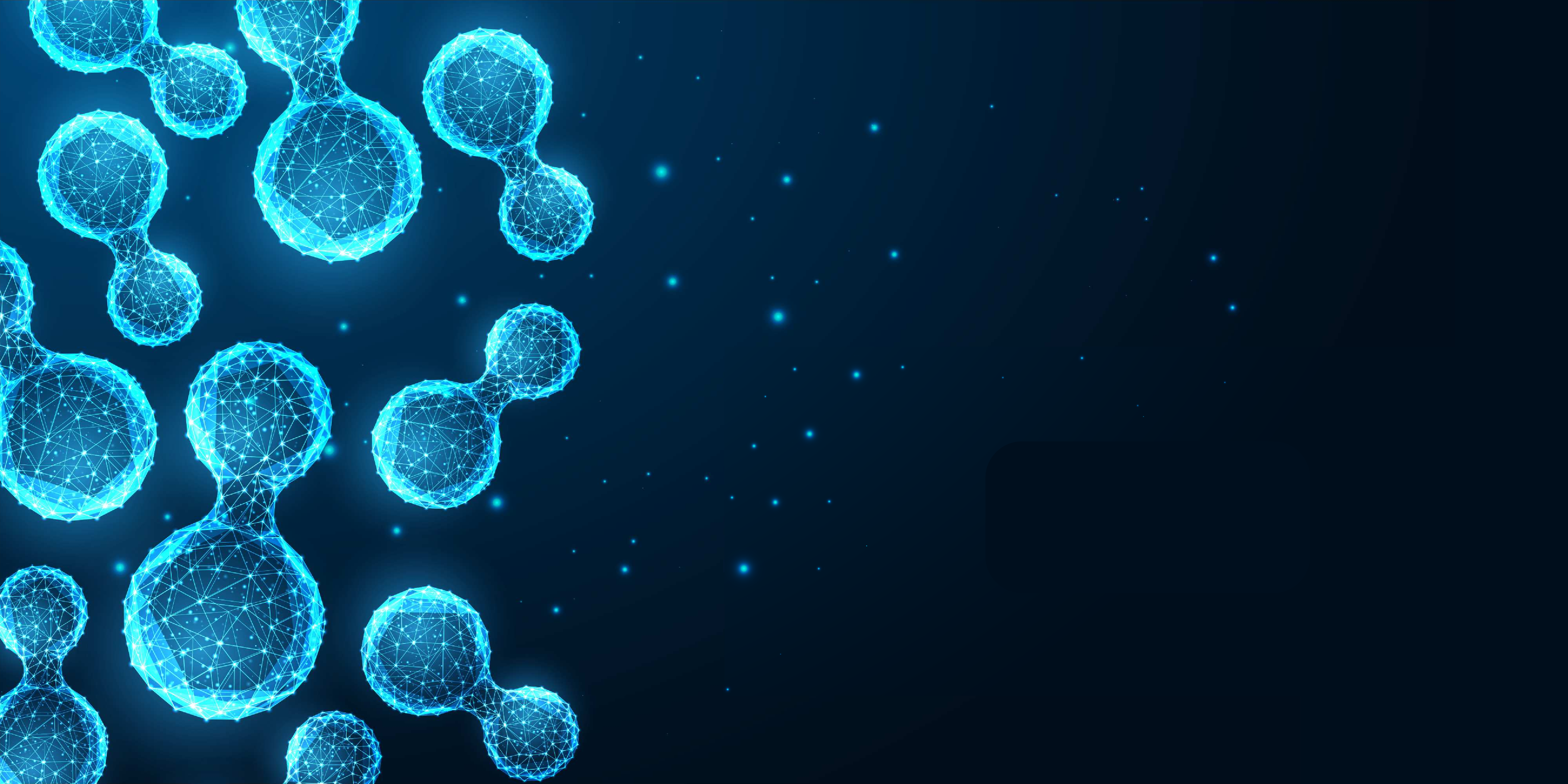
Breath Of Wellness: Inhalation, The Superior Method
While hydrogen-infused water offers remarkable benefits, the cutting-edge method of hydrogen inhalation takes your wellness journey to new heights. Inhalation allows for direct absorption of molecular hydrogen into your bloodstream, maximizing its therapeutic potential. As you breathe in the pure, therapeutic hydrogen gas, it swiftly permeates cell membranes, neutralizing harmful free radicals and reducing inflammation at the cellular level.
Rapid Absorption
Experience faster and more direct absorption of molecular hydrogen into your bloodstream, optimizing its therapeutic impact.
Cellular Penetration
Hydrogen inhalation ensures swift permeation of hydrogen gas through cell membranes, neutralizing free radicals and reducing inflammation at the cellular level.
Efficiency
Enjoy a more efficient and immersive approach to molecular hydrogen therapy, promoting overall cellular health and vitality.

The Problem with Regular Water
Ordinary water, while essential for survival, often falls short when it comes to optimizing cellular function and overall well-being. Here’s the catch: traditional water lacks the powerhouse ingredient that could take your hydration experience to the next level—Molecular Hydrogen.
While tap water or bottled water might quench your thirst, they miss the mark in delivering the comprehensive wellness benefits that your body craves. Devoid of Molecular Hydrogen, they cannot neutralize harmful free radicals, combat oxidative stress, and promote long-term cellular health.
Don’t settle for ordinary water when you can elevate your hydration experience with Hydro Heal’s Molecular Hydrogen.
Unlock Access to 50+ Expert Videos Covering the Science of Health Optimization
Dive into a comprehensive video library exploring foundational topics like toxins, molecular hydrogen, metabolism, and mitochondria. Learn about real-life expectations and personal experiences, mechanisms of action, and advanced applications in neurology, oncology, autoimmune conditions, biohacking, anti-aging, skincare, stem cells, performance metrics, and endurance.

Cancer Clinical Studies
Molecular Hydrogen as a Novel Antitumor Agent: Possible Mechanisms Underlying Gene Expression
https://www.mdpi.com/1422-0067/22/16/8724
Year: 2021
ABSTRACT:
- Many antitumor drugs yield unsatisfactory therapeutic results, yet these drugs are one of the most prevalent therapeutic measures for the treatment of cancer.
- H2 has reported efficacy against cancer and its activity in improving the side effects of cancer treatments [25-46].
UNDERLYING MECHANISMS:
- Gene Expression and Signal Transduction: H2 affects gene expression related to oxidative stress response, inflammatory pathways, and apoptosis, all of which are significant for its chemoprotective properties.
CHEMOPROTECTIVE MECHANISMS:
- Antioxidant Properties/ SELECTIVE Scavenging of Reactive Oxygen Species (ROS): Hydrogen is noted for its selective antioxidant capacity, specifically targeting the hydroxyl radicals without affecting other cellular signaling processes, which is critical during chemotherapy.
- Anti-inflammatory Effects: By modulating inflammatory pathways, hydrogen can potentially reduce the inflammatory responses typically exacerbated by chemotherapy.
- Apoptosis Regulation: Hydrogen can influence apoptotic pathways, which may help protect normal cells from programmed cell death induced by chemotherapy drugs.
H2
- MUTATION: The development of cancer largely results from mutations in nuclear DNA & mitochondrial DNA (mtDNA).
- SELECTIVE: Molecular hydrogen (H2) SELECTIVELY scavenges hydroxyl radical (·OH),
- SIDE EFFECTS: H2 has no side effects (unlike conventional antitumor drugs)
- EFFICACY: increasing number of papers on the efficacy of H2 against cancer &
https://pubmed.ncbi.nlm.nih.gov/19783965/ [26] – EFFICACY
- “Anti-cancer activity of Pt-nc-supplemented HD-water was shown by its preferential cell-growth inhibition to human carcinoma cells over normal human cells DOK… HD-water is expected as a novel agent against human cancers due to its cancer progression-repressive abilities.”
https://pubmed.ncbi.nlm.nih.gov/21042740/ [27] – EFFICACY
- “We showed that hydrogen water erased ROS indispensable for tumor cell growth by ESR/spin trap”
https://www.tandfonline.com/doi/full/10.3109/10715762.2015.1131823 [28] – EFFICACY
- “Significant suppression of cell proliferation was confirmed at 52 h following combined treatment… with H2 + Pt-nc.”
https://pubmed.ncbi.nlm.nih.gov/33387361/ [29] – EFFICACY
- “hydrogen-rich water supplementation might be applicable for carcinostatic therapy.”
https://www.scientific.net/MSF.706-709.520 [30] – EFFICACY
- “The susceptibility of cells to… hydrogen varied with the kind of cells. No influence was seen in the normal cells, while an effect of killing cancer cells was observed”
https://peerj.com/articles/859/ [31] – EFFICACY
- “Hydrogen–water enhances 5-fluorouracil-induced inhibition of colon cancer”
https://www.sciencedirect.com/science/article/abs/pii/S0753332218308667?via%3Dihub [32] – EFFICACY
- “Hydrogen gas inhibits lung cancer progression through targeting SMC3”
https://pubmed.ncbi.nlm.nih.gov/31113492/ [34] – EFFICACY
- “Molecular hydrogen suppresses glioblastoma growth via inducing the glioma stem-like cell differentiation”
https://pubmed.ncbi.nlm.nih.gov/31924176/ [35] – EFFICACY
- “Hydrogen inhibits endometrial cancer growth via a ROS/NLRP3/caspase-1/GSDMD-mediated pyroptotic pathway.”
https://aasldpubs.onlinelibrary.wiley.com/doi/10.1002/hep.25782 [37]- EFFICACY
- “Hydrogen-rich water prevents progression of… hepatocarcinogenesis in mice”
https://www.jstage.jst.go.jp/article/bpb/31/1/31_1_19/_article [38] – EFFICACY
- “The present study demonstrated that ERW down-regulated VEGF gene transcription and protein secretion through inactivation of ERK.”
https://www.spandidos-publications.com/10.3892/or.2018.6841 [39] – EFFICACY
- “Hydrogen gas restores exhausted CD8+ T cells in patients with advanced colorectal cancer to improve prognosis”
https://www.spandidos-publications.com/10.3892/ol.2020.12121 [40] – EFFICACY
- “Hydrogen gas activates coenzyme Q10 to restore exhausted CD8+ T cells… leading to better nivolumab outcomes in patients w lung cancer”
https://pubmed.ncbi.nlm.nih.gov/31552873/ [35] – EFFICACY
- “After 4 weeks of hydrogen inhalation, patients reported significant improvements in fatigue, insomnia, anorexia and pain.”
- H2 effects in mitigating side effects of cancer treatment.
- H2 is well tolerated
- H2 is a novel antitumor agent
- H2 exhibits indirect biological defense mechanisms via the regulation of gene expression.
REDOX CONTROL IN CANCER:
- The main site for the production of ROS in the cell is the mitochondria.
- ·OH ROS is about 100 times more potent than O2
- ·OH ROS is able to directly oxidize both nuclear DNA and mtDNA
- H2 can SELECTIVELY scavenge large amounts of ·OH produced in the mitochondria
- https://doi.org/10.1016/j.pharmthera.2014.04.006 [11]
- https://www.mdpi.com/2571-8797/2/4/33 [13]
CANCER & CHRONIC INFLAMMATION:
- 25% of cancers associated w chronic infections & chronic inflammation
- Chronic inflammation and oxidative stress are closely linked, and
- ·OH ROS scavengers can be used to control chronic inflammation.
- H2 ameliorates chronic inflammatory diseases via scavenging of ·OH produced in mitochondria.
- https://www.mdpi.com/1422-0067/22/5/2549 [60]
Antitumor Effects of H2
- HUMAN CLINICAL TRIALS:
- H2 gas may enhance the clinical efficacy of Nivolumab
- H2 gas inhalation can improve the QOL of cancer patients and inhibit cancer progression
- H2 gas therapy, symptomatic treatment of the bowel obstruction gradually improved and the metastases in the abdominal cavity gradually decreased; patient’s anemia improved, and their lymphocyte and tumor markers returned to normal levels
- After 4 months of monotherapy with H2 gas the size of several brain tumors was significantly reduced, as was the amount of spinal fluid from hydrocephalus associated with the brain tumors; after one year, all brain tumors had disappeared and the increase in the size of the lung and liver cancers had been controlled
- H2 gas can be used to reduce tumor progression and alleviate drug side effects in patients
ANIMAL MODELS:
- H2 in combination w (5-FU) increased the survival rate of mice compared to H2 water alone or 5-FU alone.
- H2 gas inhibited cell proliferation and enhanced apoptosis; H2 gas suppressed the expression of ROS and increased the expression of SOD, IL-1β, IL-8, IL-13, and tumor necrosis factor-α (TNF-α)
- H2 inhibits the growth of GBM through the differentiation of glioma stem-like cells
- H2 inhibits the growth of endometrial cancer
- H2 may reduce VEGF gene transcription and protein secretion via the inactivation of ERK
CELLULAR MODELS
- Reduced ·OH in ESR in a cell-free system
- The combination of H2 & Pt-nc enhanced the scavenging effect of ROS
- Inhibition of ROS production and cell proliferation
- H2 & Pt-nc in EAT cells had an inhibitory effect on cell proliferation
- H2 with nanosized PVP-Pt significantly enhanced the growth inhibition of human esophageal cancer-derived cells KYSE70
Bioavailability + Inhalation
The superior bioavailability of molecular hydrogen (H2) when administered through different routes, particularly inhalation compared to oral ingestion or intravenous methods, is a key aspect of its application in therapeutic contexts.
- This high bioavailability mainly stems from its small molecular size, allowing it to rapidly diffuse across cell membranes and reach critical intracellular targets.
- Key studies that illustrate the bioavailability and effectiveness of molecular hydrogen in human therapeutic use:
Real-time monitoring of H2 diffusion can be accomplished by measuring H2 concentrations inside various tissues using electrodes
https://www.ncbi.nlm.nih.gov/pmc/articles/PMC5731988/
- effectively penetrates biomembranes to reach
- can easily penetrates the blood–brain barrier by gaseous diffusion [90],
- while most antioxidant compounds cannot
- H2 can penetrate the blood–brain barrier by gaseous diffusion [1, 95],
INHALATION of H2
https://www.ncbi.nlm.nih.gov/pmc/articles/PMC5731988/
- Researchers have explored several convenient and effective delivery systems for H2 administration in vivo
https://pubmed.ncbi.nlm.nih.gov/24769081/
- Ohta, S. (2014). Molecular hydrogen as a preventive and therapeutic medical gas: initiation, development, and potential of hydrogen medicine. In Pharmacology & Therapeutics, 144(1), 1-11.
- Summary: This review discusses the biological effects and mechanisms of molecular hydrogen in medical applications. It covers different methods of hydrogen administration, highlighting its bioavailability and therapeutic potential based on its unique physical properties.
https://pubmed.ncbi.nlm.nih.gov/28669654/
- T. (2017). Hydrogen gas inhalation treatment
- Summary: This clinical study explores the safety and neuroprotective effects of hydrogen gas inhalation The study demonstrates quick uptake and systemic distribution of hydrogen when inhaled, essential for its therapeutic effects in acute settings
Tolerability
Safety is a primary concern with respect to H2 transportation, storage, and administration – as with any treatment modality – novel or other.
https://www.ncbi.nlm.nih.gov/pmc/articles/PMC5731988/
- H2 is flammable only at temperatures greater than 527°C, and explodes by rapid chain reaction with oxygen in the H2 concentration range of 4–75% (vol/vol) [89, 90].
- As H2 is not cytotoxic even at high concentrations, high-pressure H2 has been safely used in deep-diving gas mixes to prevent decompression sickness and arterial gas thrombi [91–93].
- Because inhaling 1–4% H2 has demonstrated great efficacy in medical applications, the use of H2 at such low concentrations has been deemed feasible and safe [1, 94].
https://www.scientific.net/MSF.706-709.520 [30]
- “The susceptibility of cells to… hydrogen varied with the kind of cells.
- No influence was seen in the normal cells, while an effect of killing cancer cells was observed”
https://www.sciencedirect.com/science/article/pii/S0163725814000941?via%3Dihub [11]
- H2 can be used for medical applications without surplus worries by several ingestion methods because inhalation of 1-4% H2 gas exhibits great efficacy
- inhalation of gas does not affect blood pressure
- H2 can be dissolved in water up to 0.8 mM (1.6 mg/L) under atmospheric pressure at room temperature without changing pH
- H2 has no cytotoxicity even at high concentration
https://www.mdpi.com/2571-8797/2/4/33 [13]
- It is different from the traditional drugs from the viewpoint of efficacy and adverse effects.
- Since H2 has extensive and various effects, it may be called a “wide spectrum molecule” on diseases.
- Moreover, due to its marked efficacy with no adverse effects
Outcomes Improvement
The concurrent use of molecular hydrogen (H2) in oncogenic therapy has been investigated in several studies. Molecular hydrogen is noted for its selective antioxidant properties, which can mitigate the adverse effects of treatments like radiotherapy and chemotherapy without compromising their anticancer efficacy. Below are some key studies that illustrate improvements in outcomes when hydrogen is used alongside oncogenic therapy:
Enhancement in Chemotherapy Tolerance
https://pubmed.ncbi.nlm.nih.gov/19148645/
- This study found that H2 treatment reduced the nephrotoxic effects of CISPLATIN, a common chemotherapy drug.
- H2 treatment did not interfere with the drug’s anti-tumor activity
https://www.ajol.info/index.php/tjpr/article/view/164283
- H2 may not only alleviate hematotoxicity in patients with hemorrhagic tendencies during CISPLATIN-based chemotherapy, but also
- H2 has a potential protective effect against other side effects induced by CISPLATIN.
Reduction of Chemotherapy-Induced Side Effects
https://pubmed.ncbi.nlm.nih.gov/29142752/
- “Protective effect of hydrogen-rich water on liver function of colorectal cancer patients treated with mFOLFOX6 chemotherapy.”
- Investigated the effects of drinking hydrogen-rich water on liver function in colorectal cancer patients undergoing chemotherapy with mFOLFOX6.
- Results indicated that hydrogen-rich water could effectively reduce the liver damage
- Typically associated with this chemotherapy regimen.
Enhancement of Chemotherapeutic Efficacy
- Study Title: “Hydrogen-rich saline enhances the antitumor activity of bortezomib and attenuates its side effects in a xenograft mouse model of multiple myeloma.”
- Authors: Yan H, Du J, Chen X, et al. Published In: Oncotarget, 2016.
- Summary: This study showed that H2 not only
- Enhanced the antitumor effects of BORTEZOMIB, a proteasome inhibitor used in multiple myeloma therapy, but also
- Decreased BORTEZOMIB’s side effects like peripheral neuropathy.
Improvement in Quality of Life for Chemotherapy Patients
- Study Title: “Molecular hydrogen decreases side effects of chemotherapy for colon cancer patients.”
- Authors: Kang KM, Kang YN, Choi IB, et al. Published In: Medical Gas Research, 2018.
- Summary: This study focused on colon cancer patients undergoing chemotherapy.
- H2 significantly decreased the side effects associated with chemotherapy,
- Thereby improving patient quality of life.
Mitigation of Oxidative Stress During Chemotherapy
- Study Title: “Molecular hydrogen: an adjunctive therapy for chemotherapy-induced side effects?”
- Authors: Sobue S, Yamai K, Ito M, et al. Published In: Free Radical Research, 2015.
- Summary: This review discusses the potential of hydrogen as an adjunctive therapy in chemotherapy, focusing on its ability to mitigate oxidative stress, which is a common pathway through which chemotherapy induces toxic side effects.
Reduction of Oxidative Stress in Cancer Treatment
https://pubmed.ncbi.nlm.nih.gov/19249288/
- It shows that H2 treatment can reduce oxidative damage,
- Potentially beneficial in mitigating lung damage from treatments like certain chemotherapies.
Overall Cancer Treatment Enhancement
https://pubmed.ncbi.nlm.nih.gov/18996093/
- The underlying mechanism of reducing oxidative stress and inflammation can be important in the context of cancer therapy, where such systemic effects can enhance overall treatment outcomes.
These studies collectively suggest that hydrogen has a promising role in oncogenic therapy by improving patient tolerance to treatments, reducing side effects, and potentially enhancing the efficacy of conventional cancer treatments through its antioxidative and anti-inflammatory properties.
These studies contribute to the growing body of evidence supporting the use of molecular hydrogen as a beneficial adjunct in chemotherapy, focusing on both enhancing the efficacy of chemotherapeutic agents and significantly reducing their harmful side effects. This dual benefit could be particularly valuable in improving overall treatment outcomes and patient quality of life during cancer therapy.
Hydrogen-rich water exerts anti-tumor effects comparable to 5-fluorouracil in a colorectal cancer xenograft model
https://doi.org/10.3892/or.2018.6841
Junji Akagi et al
STUDY TYPE: HUMAN
YEAR: 2018
INTERPRETATION OF THE PREMISE OF FINDINGS
“Molecular hydrogen (H₂) treatment significantly reinvigorated exhausted CD8+ T cells, enhancing their proliferation and cytokine production, which correlated with a marked improvement in patient prognosis and survival rates.”
QUOTE FROM BODY OF TEXT
“Notably, hydrogen gas decreased the abundance of exhausted terminal PD-1+ CD8+ T cells, increased that of active terminal PD-1- CD8+ T cells, and improved PFS and OS times, suggesting that the balance between terminal PD1+ and PD1- CD8+ T cells is critical for cancer prognosis.”
Investigating the effects of hydrogen which water on liver, cell injury and liver cancer by regulating GP73/THF-b
https://doi.org/10.21203/rs.3.rs-201468/v1Jingwen Zhang et alSTUDY TYPE: IN VITROYEAR: 2021
INTERPRETATION OF THE PREMISE OF FINDINGS“Hydrogen-rich water, by modulating the GP73/TGF-β pathway, exhibits significant protective and anti-proliferative effects on liver cells and liver cancer respectively. These findings illuminate a potential therapeutic use of hydrogen in clinical treatments for liver cancer, offering a non-invasive, adjunctive, or alternative option to traditional treatments that are often fraught with substantial adverse effects.
QUOTE FROM BODY OF TEXT“After the intervention of hydrogen-rich water, DEN increases the activity of LX-2 hepatocytes, inhibits the secretion of TGF-β, downregulates the expression of GP73, TGF-β, and Smad2 mRNA in the injured LX-2 cells, inhibits the expression of GP73 and TGF-β proteins, and exerts a protective effect on injured cells.”
Mechanism of hydrogen on CERVICAL cancer, suppression revealed by high-throughput RNA sequencing.
https://doi.org/10.3892/or.2021.8092
Guoqiang Chen et al
STUDY TYPE: IN VITRO YEAR: 2021
INTERPRETATION OF THE PREMISE OF FINDINGS
This study provides valuable insights into the mechanistic effects of molecular hydrogen (H2) on cervical cancer cells. It explores how hydrogen treatment influences key molecular pathways that control cancer cell growth and survival. Understanding these mechanisms is crucial because it adds a new dimension to the strategic management of cervical cancer, offering a basis for developing hydrogen-based therapeutic interventions.
The identification of H2 as a potential therapeutic target is particularly noteworthy. The study’s findings suggest that hydrogen treatment significantly impacts the apoptosis (programmed cell death) and proliferation rates of HeLa cervical cancer cells. Specifically, it reveals that hydrogen treatment leads to decreased expression of hypoxia-inducible factor (HIF)1A and the RELA proto-oncogene, NF-κB p65 subunit, which are critical regulators of cancer cell survival and inflammation, respectively. These proteins are often upregulated in many cancers, including cervical cancer, and are associated with poor prognosis.
QUOTE FROM BODY OF TEXT
“In conclusion, the present study suggests a novel H2-induced tumor suppression target towards HIF-1α and NF-κB. Inhibition of HIF-1α and NF-κB reduces cervical cancer HeLa cell proliferation and oxidative stress level, and decreases tumor growth, which makes H2 therapy a potential target in the treatment of cervical cancer.”
Hydrogen inhibits, ENDOMETRIAL, cancer growth via ROS/ NLRP3/ a space-1/ GSDMD-mediated pyroptotic pathway
https://doi.org/10.1186/s12885-019-6491-6
Ye Yang
STUDY TYPE: RODENT
YEAR: 2020
INTERPRETATION OF THE PREMISE OF FINDINGS
“This study supports the ability of hydrogen to stimulate NLRP3 inflammasome/GSDMD activation in pyroptosis and revealed possible mechanism(s) for improvement of anti-tumor effects in the clinical management of endometrial cancer.”
Their conclusion highlights the potential of hydrogen in activating the pyroptotic pathway to improve outcomes in endometrial cancer treatment.
The study provides foundational knowledge which may be translated into clinical settings, potentially enhancing therapeutic strategies against endometrial cancer by leveraging the cell death pathway of pyroptosis, specifically through the ROS/NLRP3/caspase-1/GSDMD axis.
QUOTE FROM BODY OF TEXT
“In the present study, we explored the effects of hydrogen on endometrial cancer and provided the first evidence that hydrogen induces pyroptosis via ROS-NLRP3-caspase-1 pathways. We demonstrated that drinking hydrogen-enriched water reduced the volume and weight of endometrial tumors in a xenograft mouse model.”
Molecular Hydrogen Inhibits Colorectal Cancer Growth via the AKT/SCD1 Signaling Pathway
https://doi.org/10.1155/2022/8024452
Boyan Liu et al
STUDY TYPE: IN VITRO
YEAR: 2022
INTERPRETATION OF THE PREMISE OF FINDINGS
“This study underscores the potential of molecular hydrogen (H2) as a novel therapeutic in oncology, particularly for colorectal cancer (CRC). By inhibiting the pAKT/SCD1 pathway, H2 treatment significantly reduced tumor proliferation and volume, suggesting a dual function of targeting cancer growth and the associated molecular pathways. Such findings advocate for hydrogen’s integration into cancer treatment protocols, potentially offering a less invasive option that minimizes the severe side effects associated with traditional chemotherapies.”
QUOTE FROM BODY OF TEXT
“In our study, we found that hydrogen did not change the expression of total AKT but significantly decreased pAKT levels, indicating that hydrogen might suppress colorectal cancer cell proliferation by inducing pAKT (Ser473). The inhibition of cell proliferation induced by H2 was reversed by treatment with SC79 in all three cell lines. This result demonstrated that hydrogen inhibited colorectal cancer cell survival by reducing pAKT.”
Hydrogen gas restores exhausted CD8 + T cells in patients with advanced COLORECTAL cancer to improve prognosis
https://doi.org/10.3892/or.2018.6841
Junji Akagi et al
STUDY TYPE: HUMAN
YEAR: 2018
INTERPRETATION OF THE PREMISE OF FINDINGS
“Molecular hydrogen (H₂) treatment significantly reinvigorated exhausted CD8+ T cells, enhancing their proliferation and cytokine production, which correlated with a marked improvement in patient prognosis and survival rates.”
QUOTE FROM BODY OF TEXT
“Notably, hydrogen gas decreased the abundance of exhausted terminal PD-1+ CD8+ T cells, increased that of active terminal PD-1- CD8+ T cells, and improved PFS and OS times, suggesting that the balance between terminal PD1+ and PD1- CD8+ T cells is critical for cancer prognosis.”

